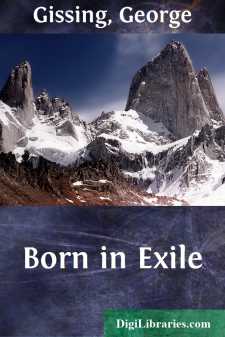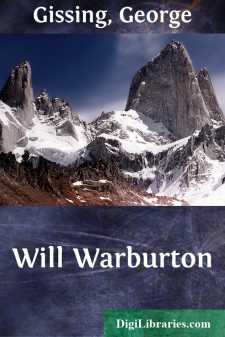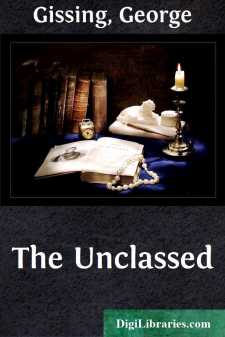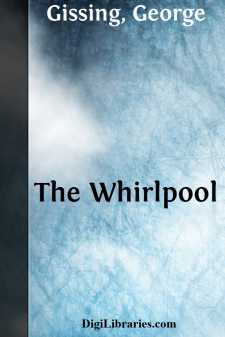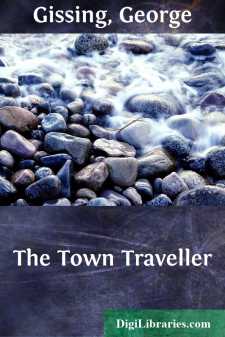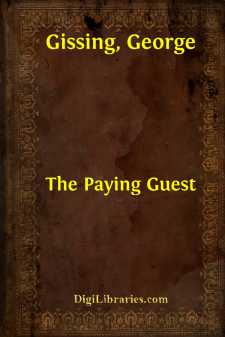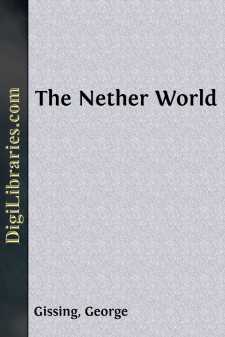Categories
- Antiques & Collectibles 13
- Architecture 36
- Art 48
- Bibles 22
- Biography & Autobiography 813
- Body, Mind & Spirit 142
- Business & Economics 28
- Children's Books 15
- Children's Fiction 12
- Computers 4
- Cooking 94
- Crafts & Hobbies 4
- Drama 346
- Education 46
- Family & Relationships 57
- Fiction 11828
- Games 19
- Gardening 17
- Health & Fitness 34
- History 1377
- House & Home 1
- Humor 147
- Juvenile Fiction 1873
- Juvenile Nonfiction 202
- Language Arts & Disciplines 88
- Law 16
- Literary Collections 686
- Literary Criticism 179
- Mathematics 13
- Medical 41
- Music 40
- Nature 179
- Non-Classifiable 1768
- Performing Arts 7
- Periodicals 1453
- Philosophy 64
- Photography 2
- Poetry 896
- Political Science 203
- Psychology 42
- Reference 154
- Religion 513
- Science 126
- Self-Help 84
- Social Science 81
- Sports & Recreation 34
- Study Aids 3
- Technology & Engineering 59
- Transportation 23
- Travel 463
- True Crime 29
George Gissing
George Gissing (1857-1903) was an English novelist known for his works depicting the harsh realities of lower-middle-class life in late Victorian society. His most notable novels include "New Grub Street" and "The Odd Women," which critically examine the struggles and moral dilemmas faced by writers and women, respectively. Gissing's detailed and often bleak portrayals of urban poverty and social issues have earned him recognition as a significant figure in English literature.
Author's Books:
Sort by:
by:
George Gissing
CHAPTER I The summer day in 1874 which closed the annual session of Whitelaw College was marked by a special ceremony, preceding the wonted distribution of academic rewards. At eleven in the morning (just as a heavy shower fell from the smoke-canopy above the roaring streets) the municipal authorities, educational dignitaries, and prominent burgesses of Kingsmill assembled on an open space before the...
more...
by:
George Gissing
CHAPTER 1 The sea-wind in his hair, his eyes agleam with the fresh memory of Alpine snows, Will Warburton sprang out of the cab, paid the driver a double fare, flung on to his shoulder a heavy bag and ran up, two steps at a stride, to a flat on the fourth floor of the many-tenanted building hard by Chelsea Bridge. His rat-tat-tat brought to the door a thin yellow face, cautious in espial, through the...
more...
by:
George Gissing
SCHOOL There was strange disorder in Miss Rutherford's schoolroom, wont to be the abode of decorum. True, it was the gathering-time after the dinner-hour, and Miss Rutherford herself was as yet out of sight; but things seemed to be going forward of a somewhat more serious kind than a game of romps among the children. There were screams and sobbings, hysterical cries for help; some of the little...
more...
by:
George Gissing
CHAPTER 1 Harvey Rolfe was old enough to dine with deliberation, young and healthy enough to sauce with appetite the dishes he thoughtfully selected. You perceived in him the imperfect epicure. His club had no culinary fame; the dinner was merely tolerable; but Rolfe's unfinished palate flattered the second-rate cook. He knew nothing of vintages; it sufficed him to distinguish between Bordeaux and...
more...
by:
George Gissing
SPRING I. For more than a week my pen has lain untouched. I have written nothing for seven whole days, not even a letter. Except during one or two bouts of illness, such a thing never happened in my life before. In my life; the life, that is, which had to be supported by anxious toil; the life which was not lived for living’s sake, as all life should be, but under the goad of fear. The...
more...
by:
George Gissing
AMONG THE HILLS There were three at the breakfast-table—Mr. Newthorpe, his daughter Annabel, and their visitor (Annabel's Cousin), Miss Paula Tyrrell. It was a small, low, soberly-furnished room, the walls covered with carelessly-hung etchings and water-colours, and with photographs which were doubtless mementoes of travel; dwarf bookcases held overflowings from the library; volumes in disorder,...
more...
by:
George Gissing
CHAPTER I Moggie, the general, knocked at Mr. Gammon's door, and was answered by a sleepy "Hallo?" "Mrs. Bubb wants to know if you know what time it is, sir? 'Cos it's half-past eight an' more." "All right!" sounded cheerfully from within. "Any letters for me?" "Yes, sir; a 'eap." "Bring 'em up, and put 'em under the door....
more...
by:
George Gissing
CHAPTER I Wilfrid Athel went down invalided a few days after the beginning of Trinity term. The event was not unanticipated. At Christmas it had been clear enough that he was overtaxing himself; his father remarked on the fact with anxiety, and urged moderation, his own peculiar virtue. Wilfrid, whose battle with circumstances was all before him, declined to believe that the body was anything but the...
more...
by:
George Gissing
CHAPTER I It was Mumford who saw the advertisement and made the suggestion. His wife gave him a startled look. 'But—you don't mean that it's necessary? Have we been extrav—' 'No, no! Nothing of the kind. It just occurred to me that some such arrangement might be pleasant for you. You must feel lonely, now and then, during the day, and as we have plenty of room—'...
more...
by:
George Gissing
CHAPTER I In the troubled twilight of a March evening ten years ago, an old man, whose equipment and bearing suggested that he was fresh from travel, walked slowly across Clerkenwell Green, and by the graveyard of St. James's Church stood for a moment looking about him. His age could not be far from seventy, but, despite the stoop of his shoulders, he gave little sign of failing under the burden...
more...


